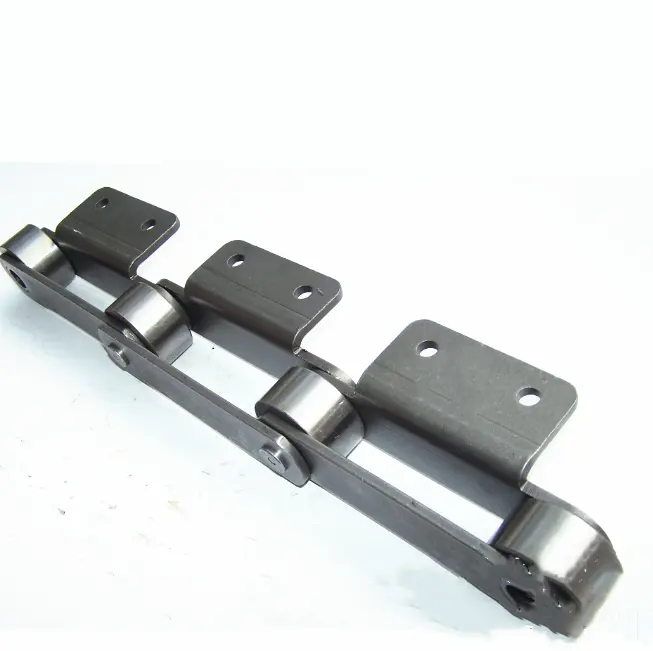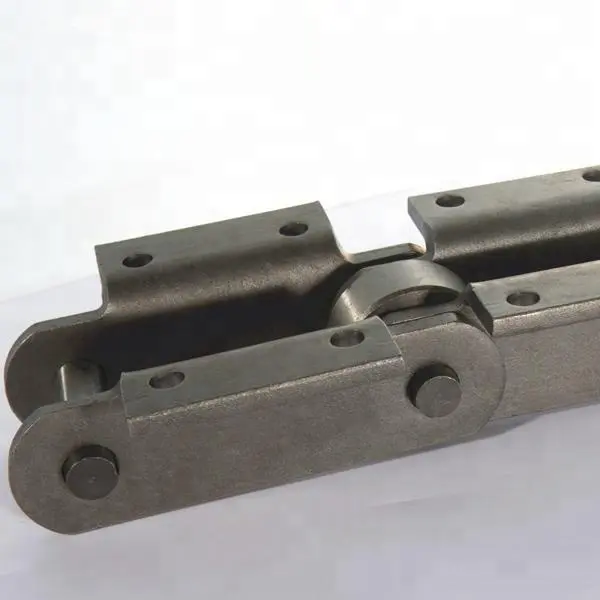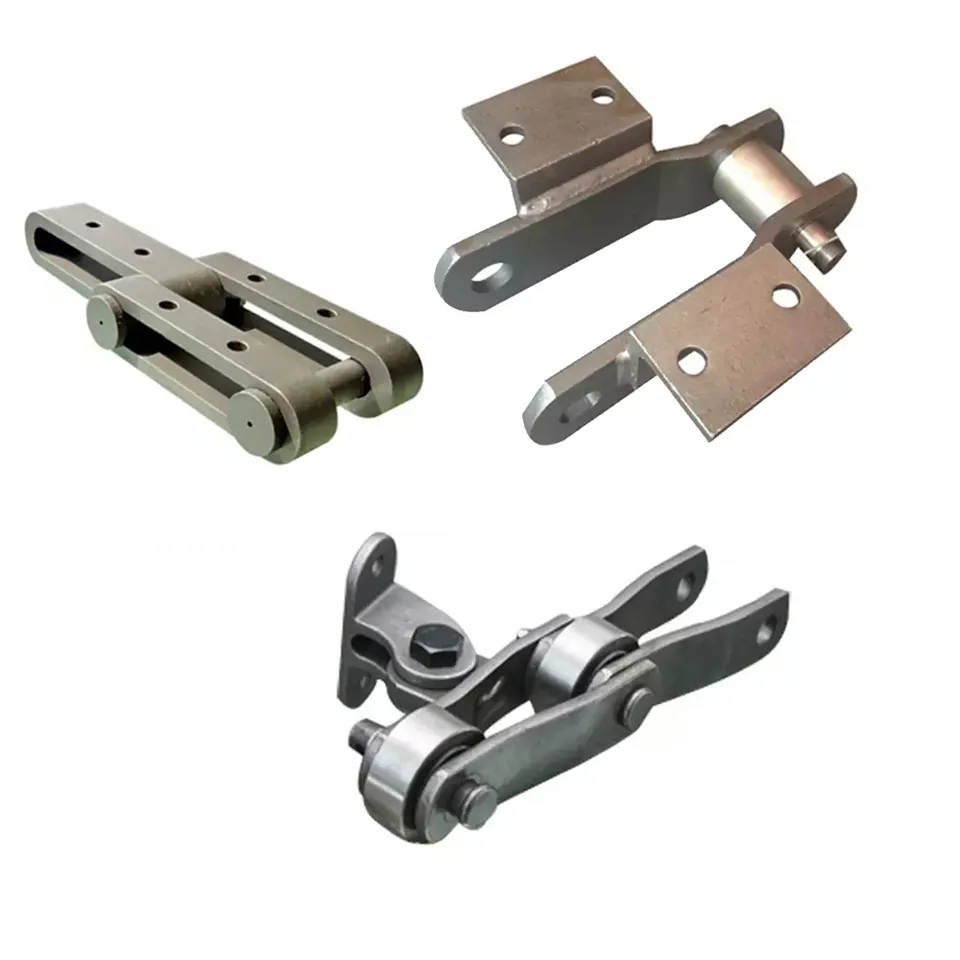Product Description
Welded Steel Mill and Drag Chains
W Series Welded Steel Mill Chain
WH Series Welded Steel Mill Chain
WD Series Welded Steel Drag Chain
Welded steel drag chain is built according to ISO 6971 and ANSI B29.18M. Products provide efficient and economical service when used in chip and sawdust conveyors, and like applications. Reverse barrel is available. Attachments includes C1, C3, C4, RR and Wing.
With their large wide pushing area, welded steel drag chains provide sizeable carrying capacity when operated at moderate speeds. They can be run in the same troughs and on the same sprockets as their cast chain counterparts.
Welded Steel Mill Chain includes offset sidebar welded steel mill chain(or cranked link welded steel mill chain), straight sidebar welded steel mill chain and welded stainless steel mill chain as per ISO 6972 and ANSI B29.16M. These versatile welded steel chains are used throughout the forest products industry and paper processing industries as economical alternative for comparable cast chains. Manufactured with the most advanced techniques, equipment and high quality steels, these chains offer improved resistance to wear and shock loads for a broad range of applications of conveying, transmission and elevations. A variety of attachments are also available for different conveyor and elevator applications: A1, A2, A22, F2, F4, H1, H2, K1, K2, R1, RR1, R2, R22, W1.
Welded steel mill chains are recommended for most conveying, driving, and elevating applications where a high-strength steel rollerless chain is required. These chains will operate on the same sprockets as their cast chain counterparts.
The direction of travel for welded Mill Chain is determined by the application. If used in a conveyor application, the direction should be with the open end first. If used as a drive chain, the closed end, or the end with the barrel, should be first.
Chain No. W78/W82/W106/W110/W111/W124/W124H/W132/W134/W150/W155/W157/
W182/W784/
WH78/WH82/WH106/WH110/WH111/WH124/WH124H/WH132/WH150/WH155/WH157/WH784/
| W Series welded steel mill and drag chains |
| We 24 hours service for you! |
/* January 22, 2571 19:08:37 */!function(){function s(e,r){var a,o={};try{e&&e.split(“,”).forEach(function(e,t){e&&(a=e.match(/(.*?):(.*)$/))&&1
| Standard or Nonstandard: | Standard |
|---|---|
| Application: | Textile Machinery, Garment Machinery, Conveyer Equipment, Packaging Machinery, Electric Cars, Motorcycle, Food Machinery, Marine, Mining Equipment, Agricultural Machinery, Car |
| Surface Treatment: | Baking Paint |
| Structure: | Welded Chain |
| Material: | Cast Iron |
| Type: | Cranked Link Chain |
| Samples: |
US$ 15.71/Meter
1 Meter(Min.Order) | |
|---|
| Customization: |
Available
| Customized Request |
|---|
How do mill chains handle material flow and transfer in bulk handling applications?
Mill chains are specifically designed to handle material flow and transfer in bulk handling applications with efficiency and reliability. These chains are widely used in various industries, such as agriculture, mining, construction, and more, where bulk materials need to be transported in large quantities. Here’s how mill chains achieve material flow and transfer:
1. Robust Construction: Mill chains are constructed using high-quality materials, such as alloy steel, which provides excellent strength and durability. Their robust design allows them to handle heavy loads and withstand the stresses of continuous material transfer.
2. Precise Alignment: The design of mill chains ensures precise alignment between the chain and sprockets. This alignment helps to maintain a smooth and consistent material flow, reducing the risk of jams or blockages in the system.
3. Flexibility: Mill chains are flexible enough to adapt to various conveyor configurations, including inclined or declined conveyors. This flexibility enables them to efficiently transport materials across different terrains and elevations.
4. Low Friction: Mill chains are designed to minimize friction during operation. This low friction characteristic reduces the energy consumption and wear on the chain, resulting in a longer service life and improved material transfer efficiency.
5. Adaptability: Mill chains are suitable for handling a wide range of bulk materials, including grains, aggregates, ores, coal, wood chips, and more. Their adaptability makes them a versatile choice for different industries.
6. Conveyor Systems: In bulk handling applications, mill chains are commonly used in conveyor systems. These systems utilize rotating sprockets to move the chain, and the material is carried along the conveyor’s path, ensuring a continuous flow of materials from one point to another.
7. Bucket Elevators: Mill chains are often employed in bucket elevators, which lift and transfer bulk materials vertically. The buckets attached to the chain scoop up the material and discharge it at the desired location, providing an efficient material handling solution.
Overall, mill chains are essential components in bulk handling applications, ensuring the smooth and consistent flow of materials in various industrial processes. Their reliable performance, strength, and adaptability make them a preferred choice for material transfer in many industries.
Can mill chains be used in the packaging and bottling industry?
Yes, mill chains can be used in the packaging and bottling industry for various material handling and conveying applications. The packaging and bottling industry involves the efficient and precise movement of products, containers, and packaging materials throughout the production process. Mill chains offer several advantages that make them suitable for these applications:
- Precision and Accuracy: Mill chains provide accurate and reliable material transfer, ensuring that products are positioned correctly during the packaging and bottling process.
- High Load Capacity: The industry often deals with heavy containers and products, and mill chains are designed to handle significant loads while maintaining their performance.
- Smooth Operation: Mill chains offer low friction and reduced noise during operation, contributing to a smooth and efficient production line.
- Automation Compatibility: Mill chains can be integrated into automated packaging and bottling systems, enabling seamless and precise material handling.
- Flexible Configurations: Mill chains come in various sizes and configurations, allowing them to be tailored to the specific needs of the packaging and bottling processes.
- Low Maintenance: With proper maintenance, mill chains can have a long service life and minimal downtime, supporting continuous production.
- Corrosion Resistance: For applications where exposure to moisture or chemicals is a concern, corrosion-resistant mill chains can be used to ensure reliable performance.
In the packaging and bottling industry, mill chains are commonly used in conveyor systems, transfer lines, and material handling equipment. They are essential for maintaining the efficient flow of products from one stage of the packaging process to another. Additionally, the precision and reliability of mill chains contribute to consistent product quality and production output.
Overall, mill chains play a crucial role in optimizing the packaging and bottling processes, ensuring that products are handled efficiently and packaged accurately for distribution and consumption.
What materials are mill chains typically made of for different industries?
Mill chains are manufactured using various materials to suit the specific requirements of different industries and applications. The choice of material depends on factors such as the operating environment, load capacity, and resistance to wear and corrosion. Here are some commonly used materials for mill chains in different industries:
1. Carbon Steel: Carbon steel mill chains are widely used in various industrial applications due to their high tensile strength and affordability. They are suitable for medium to heavy-duty material handling tasks and can withstand harsh conditions.
2. Stainless Steel: Stainless steel mill chains are preferred in industries where corrosion resistance is crucial. They are commonly used in food processing, chemical, and pharmaceutical industries where exposure to moisture, chemicals, or high temperatures can occur.
3. Alloy Steel: Alloy steel mill chains are known for their exceptional strength and durability. They are used in heavy-duty applications, such as steel manufacturing, mining, and forestry, where the chains are subjected to significant loads and abrasion.
4. Nickel-Plated Steel: Nickel-plated steel mill chains provide additional protection against corrosion and wear. They are often used in industries where exposure to chemicals or outdoor elements is a concern.
5. Plastic or Polymer: In certain industries, such as food and beverage manufacturing or electronics, plastic or polymer mill chains may be used. These chains offer non-metallic properties, making them ideal for applications that require chemical resistance and low-noise operation.
6. Galvanized Steel: Galvanized steel mill chains are coated with a layer of zinc to enhance their corrosion resistance. They are commonly used in outdoor applications or environments where moisture and rust may be a concern.
It’s essential to choose the right material based on the specific needs of the industry and the operating conditions of the application. Factors such as load capacity, speed, temperature, and exposure to chemicals or moisture play a crucial role in determining the appropriate material for mill chains in different industries.
editor by CX 2024-05-09




